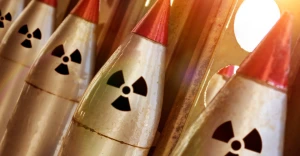
Ukrainian-Polish reconciliation is key to Ukraine's European integration - international observer
International observer Yehor Brailian believes that the main key to Ukraine's European integration is the historical reconciliation between Ukraine and Poland
He said this on Espreso TV.
"When Ukrainians and Poles reconcile on the issues of history and many other points, this will be the key to our European integration and to the central European identity. Without this, our European integration will not be successful, as Poland is a leader in central Europe and remains influential for other countries," Brailian said.
Countries should remember the confrontation, the Volyn tragedy, World War I, the November Uprising, the Vistula Action, and World War II, but they should also move on. Germany and France should serve as examples of successful European integration for us, says the international observer.
"The very idea of European integration became possible because of the reconciliation between France and Germany. After World War II, they realized that they no longer needed such horrors. I mean, the same Adenauer (former German Foreign Minister - ed.) remembered all these times, the First World War, the Second World War, and I think they came to a point where there was nowhere else to go. And the Russian-Ukrainian war, the Russian threat, united Poles and Ukrainians. The Poles realized that Ukrainians are fighting for the freedom of all Europeans, and that is why it is worth stopping these disputes. I think it will be possible, it is worth working with different Poles in different ways," Brailian said.
According to him, France and Germany are an example of a long-lasting confrontation.
"François Mitterrand (former President of France - ed.) and Helmut Kohl (former Federal Chancellor of the Federal Republic of Germany - ed.) stood together in Verdun, 40 years after the end of World War II. Despite much blood, trauma, and much more, they found this understanding between them," Brailian added.
Ukraine's accession to the EU
Ukraine applied for EU membership on 28 February 2022 during the Russian-Ukrainian war.
On June 23, 2022, Ukraine was granted candidate status for EU membership.
In May, Ukraine’s Prime Minister Denys Shmyhal said that Ukraine should be ready to join the EU in two years - the country expects to receive a political decision to start accession negotiations this year.
According to Espreso's sources, the European Parliament is considering the possibility of starting negotiations on Ukraine's accession to the EU this fall.
However, on August 17, Deputy Prime Minister for European and Euro-Atlantic Integration Olha Stefanishyna said that Ukraine would not be able to implement all 7 EU recommendations by October, as these are changes that have been implemented over the years.
Maria Mezentseva, Deputy Head of the Verkhovna Rada Committee on Ukraine's Integration with the EU, Head of the Permanent Delegation to PACE, noted that it is necessary to wait for the October report of the European Commission on the implementation of 7 EU recommendations by Ukraine.
On August 28, European Council President Charles Michel said that the European Union should be ready to accept new member states by 2030. The EU High Representative for Foreign Affairs and Security Policy, Josep Borrell, expressed support for setting a tentative ‘time target’ for new members to join the EU.
On September 8, Lithuanian President Gitanas Nausėda said it was important that negotiations on Ukraine's accession to the EU begin by the end of this year. A clear European perspective will inspire Ukrainians on the battlefield.
On September 21, the head of the Servant of the People parliamentary faction, Davyd Arakhamia, said that the Ukrainian parliament has passed 99.9% of what is needed to start negotiations on EU membership.
Media reports suggest that Ukraine will receive a recommendation to start negotiations on November 8, but that additional conditions will be put forward. And on December 14-15, the EU summit will decide whether to start membership talks with Ukraine.
On October 26, Stefanishyna expressed confidence that Ukraine would be able to reach a good political decision on joining the EU in December.
On October 28, President Zelenskyy addressed the leaders of the European Union, calling for unity in the decision to start negotiations on Ukraine's accession to the EU.
On October 31, Foreign Minister Dmytro Kuleba assured that Ukraine would start negotiations on EU membership this year, barring force majeure.
On November 4, Zelenskyy said that Ukraine is not asking for "concessions" on its path to EU membership.
As of early November, the European Commission considered four of the seven criteria for granting Ukraine the status of a candidate for EU membership to be fully met.
On Tuesday, November 8, the European Commission released a report in which it recognized Ukraine's progress and recommended that the process of negotiating Ukraine's accession to the EU be launched.
- News














































